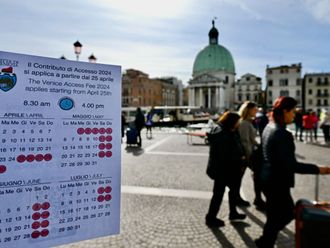Accra: When Muhammadu Buhari took over as Nigeria’s president less than a year ago, he vowed to wipe out the corruption he said threatened the very existence of Africa’s largest economy.
But as he investigates former ministers and high-ranking officials, members of the opposition People’s Democratic Party accuse him of carrying out a vendetta against them. Buhari ousted the PDP following March elections, ending the party’s monopoly on power that it held since the end of military rule in 1999.
The PDP called for Buhari to be impeached last week for “various constitutional” breaches, including the arrest this month of its national spokesman, Olisa Metuh. He was detained as part a probe into whether the previous government stole as much as $5.5 billion (Dh20.2 billion) meant for fighting an Islamist insurgency in the north. Sambo Dasuki, the national security adviser under the administration of Goodluck Jonathan, was also arrested as part of the same investigation.
“Yes, there is a witch-hunt, because there are witches all over the place,” said Folarin Gbadebo-Smith, head of the Lagos- based Centre for Public Policy Alternatives and a former council leader in the commercial capital. “There are guilty parties out there.”
The arrests have heightened regional and ethnic tensions in Nigeria, a country of 170 million split between a mostly Muslim north and a predominantly Christian south. Buhari, a 73-year-old northerner and former general, got the bulk of his votes from his home region and the religiously mixed southwest through the coalition of his All Progressives Congress, formed in 2013 by a merger of smaller opposition parties and disgruntled PDP politicians.
Some southern and the bulk of the southeastern states voted overwhelmingly for the PDP’s candidate, then President Jonathan, a Christian who hails from the oil-producing Niger River delta region.
“It’s not rocket science for anybody to assume it is a targeted approach,” Annkio Briggs, a human-rights activist focused on the Niger delta, said in an interview in the southern oil industry hub of Port Harcourt. “It is being done as if only members of the PDP are corrupt.”
Corruption has long blighted Nigeria since independence from the UK in 1960. Africa’s largest oil producer came 136th out of 175 countries in Transparency International’s latest global ranking, the same level as Russia. Buhari has blamed graft for keeping most Nigerians in poverty and for the dire state of the country’s roads, schools and hospitals.
Billions Looted
While Buhari promised his government would be impartial in its investigations, he has accused the previous administration of looting billions of dollars and said that he inherited a “virtually empty treasury”.
Buhari’s spokesman, Garba Shehu, said it was logical for authorities to go after those who handled Nigeria’s finances in previous years.
“The APC was outside the government, it was not invited to share the money,” Shehu said by phone on Sunday. “The APC had no access to crude oil money or defence money. The PDP handled the money. They should account for it.”
Rising political tensions could threaten Buhari’s ability to carry out the widespread reforms he promised. Those include boosting Nigeria’s poor electricity supply and improving its dilapidated infrastructure, at a time when the economy, which depends on oil for two-thirds of government revenue, is reeling from falling crude prices and growing at its slowest pace this century.
While last year’s elections dealt a blow to the PDP, it still has almost half the seats in the Senate and over a third in the House of Representatives, which it can exploit to stall Buhari’s plans. The party showed its clout last year when it backed rivals to Buhari’s preferred candidates for leaders of each of the chambers. Both the rivals prevailed, thanks to the PDP’s support.
Party Unity
The PDP’s grievances have grown as the anticorruption campaign gathers momentum. Buhari’s APC is “violating people’s rights in the name of fighting corruption,” the PDP said on Jan. 14 when it called for the president to be impeached.
Buhari’s spokesman Shehu said the APC has dismissed the impeachment threats as “childish” and that “absolutely zero will come of it.”
“The natural thing to do, for the drive to be seen to be more fair, would be to empower investigators to go after people close to Buhari, people who sponsored his campaign, even people in his own cabinet,” said Manji Cheto, an analyst at London- based Teneo Intelligence. “Do I think he’s going to do it? No. The moment he goes down that path, he begins to threaten the unity of his own party.”












